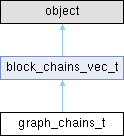|
| int | for_all_chains (self, 'chain_visitor_t' cv, int gca_flags) |
| |
| bool | is_locked (self) |
| |
| None | acquire (self) |
| |
| None | release (self) |
| |
| None | swap (self, 'graph_chains_t' r) |
| |
| | __init__ (self) |
| |
| 'block_chains_t &' | push_back (self, *args) |
| |
| None | pop_back (self) |
| |
| 'size_t' | size (self) |
| |
| bool | empty (self) |
| |
| 'block_chains_t const &' | at (self, 'size_t' _idx) |
| |
| None | qclear (self) |
| |
| None | clear (self) |
| |
| None | resize (self, *args) |
| |
| None | grow (self, *args) |
| |
| 'size_t' | capacity (self) |
| |
| None | reserve (self, 'size_t' cnt) |
| |
| None | truncate (self) |
| |
| 'block_chains_t *' | extract (self) |
| |
| None | inject (self, 'block_chains_t' s, 'size_t' len) |
| |
| 'qvector< block_chains_t >::const_iterator' | begin (self, *args) |
| |
| 'qvector< block_chains_t >::const_iterator' | end (self, *args) |
| |
| 'qvector< block_chains_t >::iterator' | insert (self, 'block_chains_t' it, 'block_chains_t' x) |
| |
| 'qvector< block_chains_t >::iterator' | erase (self, *args) |
| |
| 'size_t' | __len__ (self) |
| |
| 'block_chains_t const &' | __getitem__ (self, 'size_t' i) |
| |
| None | __setitem__ (self, 'size_t' i, 'block_chains_t' v) |
| |
| None | append (self, 'block_chains_t' x) |
| |
| None | extend (self, 'block_chains_vec_t' x) |
| |
◆ __init__()
◆ acquire()
◆ for_all_chains()
Visit all chains
@param cv: chain visitor
@param gca_flags: combination of GCA_ bits
◆ is_locked()
Are the chains locked? It is a good idea to lock the chains before using them. This ensures that they won't be recalculated and reallocated during the use. See the chain_keeper_t class for that.
◆ release()
◆ swap()
◆ thisown
Initial value:= property(lambda x: x.this.own(), lambda x, v: x.this.own(v),
doc='The membership flag')
The documentation for this class was generated from the following file:

 Public Member Functions inherited from block_chains_vec_t
Public Member Functions inherited from block_chains_vec_t Properties inherited from block_chains_vec_t
Properties inherited from block_chains_vec_t Static Public Attributes inherited from block_chains_vec_t
Static Public Attributes inherited from block_chains_vec_t